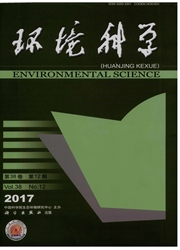

 中文摘要:
中文摘要:
考察了重金属(Cu、Cd、Pb)对白腐菌生长及其降解十溴联苯醚(BDE-209)的影响及其机制.结果表明,低浓度重金属(≤1 mg.L-1)可促进白腐菌的生长,高浓度则表现为抑制作用,1 mg.L-1时促进作用大小为:Cd〉Pb〉Cu;白腐菌可高效降解BDE-209,7 d内对BDE-209(1 mg.L-1)降解率可达69.7%;重金属可显著影响白腐菌对BDE-209的降解(P〈0.05),低浓度的Cu(≤1 mg.L-1)和Cd(≤0.5 mg.L-1)对BDE-209的降解表现为促进作用,其中Cu为1 mg.L-1时促进作用最明显,降解率为84.4%,而Pb则为抑制作用;高浓度(〉1 mg.L-1)的重金属均会抑制BDE-209的降解,抑制作用大小为Cd〉Pb〉Cu,且随浓度增大抑制作用增强;降解率与生物量变化不完全正相关.白腐菌对BDE-209的降解过程符合一级反应动力学方程,Cu、Cd存在条件下,随着其浓度的增加,降解速率常数k表现为先增加后减少,Cu为1 mg.L-1时k值达到最大,为0.321 2;Pb存在条件下,k值表现为逐渐减小.进一步研究了重金属对白腐菌胞外酶降解BDE-209的影响,并运用SPSS 17.0对胞外酶降解与菌体降解进行距离相关性分析,结果表明,未添加重金属时胞外酶降解与菌体降解差异不大,其降解率分别为63.7%、69.7%;3种重金属存在条件下其相关系数R值均大于0.9,由此推断胞外酶是起降解作用的主要部分,重金属主要通过影响白腐菌胞外酶的方式作用于BDE-209的降解.
 英文摘要:
英文摘要:
Effects and mechanisms of heavy metals Cu,Cd and Pb on the growth of white-rot fungus P.chrysosporium and its ability of BDE-209 degradation were studied.The results showed that low concentrations of heavy metals(≤1 mg·L-1) stimulated the growth of P.chrysosporium with the order of CdPbCu when 1 mg·L-1 of each heavy metal was concerned,while high concentrations(1 mg·L-1) depressed it.P.chrysosporium degraded BDE-209 efficiently with degradation efficiency reaching 69.7% after 7 days.The presence of heavy metals significantly influenced the capability of P.chrysosporium to decompose BDE-209(P0.05).Low concentrations of Cu(≤1 mg·L-1) and Cd(≤0.5 mg·L-1) accelerated the degradation of BDE-209 and the degradation efficiency was enhanced from 69.7% to 84.4% when 1 mg·L-1 Cu was present,while Pb had negative effect.On the other hand,all three metals under high concentrations(1 mg·L-1) showed depressed effects on the degradation in the order of CdPbCu.The growth of P.chrysosporium did not completely positively correlate with the degradation capability of BDE-209.The degradation of BDE-209 by P.chrysosporium conformed to the first-order kinetic model.The reaction rate constant k raised firstly and then declined with increasing concentrations of Cu and Cd,and the highest k of 0.321 2 achieved in the presence of 1 mg·L-1 Cu.By contrast,the constant k declined all the way when Pb existed.A further investigation into the effects of heavy metals on degradation of BDE-209 by extracellular enzymes derived from P.chrysosporium was conducted,and the distance correlation analysis of the degradation by extracellular enzymes and the whole cell was carried out.The results demonstrated that the degradation by extracellular enzymes and the whole cell was 63.7%,69.7% separately,showing no significant difference of degradation capability between them,which proved that the extracellular enzymes played dominating role in the degradation of BDE-209.Furthermore,the distance correlation coefficient R were
 同期刊论文项目
同期刊论文项目
 同项目期刊论文
同项目期刊论文
 Alteration of Heavy Metal Fractions in Soil of Guiyu, South China by Native Bacillus cereus under th
Alteration of Heavy Metal Fractions in Soil of Guiyu, South China by Native Bacillus cereus under th Polycyclic aromatic hydrocarbons on indoor/outdoor glass window surfaces in Guangzhou and Hong Kong,
Polycyclic aromatic hydrocarbons on indoor/outdoor glass window surfaces in Guangzhou and Hong Kong, 期刊信息
期刊信息
